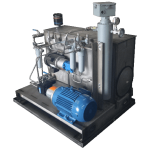What To Do If A Bidirectional Valve Locks Up
Hydraulic machines are a series of interconnected mechanisms that create a smooth and powerful action. All of these mechanisms add up to the overall movement of the machine. A failure in any of these mechanisms can prove to be a big problem. The machine can malfunction, stop working altogether, or become damaged if the issue is not rectified. Extreme cases will require the assistance of a company experienced in pneumatic and hydraulic services.
Problems in these machines often come from simple mechanisms not working exactly as they should. The ability to recognize these malfunctions is advantageous. Any simple fix can prove beneficial. We’re going to look at one such mechanism that might seem small in the grand scheme of the operation of a machine, but can have a drastic impact on how efficiently it works.
What Is A Bidirectional Valve
At its most basic, a valve is a mechanism that can open or close. It is used to either allow or cut off the passage of a fluid or air through a pipe. A bidirectional valve is able to allow or block a fluid moving in either direction.
What Is It Used For?
Bidirectional valves are used to regulate the flow of hydraulic fluid. They allow the fluid to move in either direction, which moves the mechanism in either a positive or negative way.
They are also useful for isolating specific areas within a machine because flow can be cut off in either direction of the valve. A unidirectional valve is sufficient if fluid or air only moves in one direction, but this is not always the case. Some systems will move fluid and air in either direction depending on how the mechanism needs to operate—this is when a bidirectional valve becomes necessary. This is particularly true in the case of maintenance. A bidirectional valve offers more flexibility when it comes to isolating a particular area.
Air & Hydraulic Equipment, Inc. offers pneumatic and hydraulic services in TN and GA. Visit us today to see how we can help you.
How Does It Work?
There are many different kinds of bidirectional valves—floating ball valve, knife gate valve, and stop valves are all examples of bidirectional valves. For the sake of narrowing it down, let’s talk about a directional control valve. A directional control valve operates with a mechanism inside that directs the flow of fluid. The neutral position will simply run the fluid back into the reservoir. The first position will send the fluid through in one direction, while the third position reverses the process.
What To Do If It Locks Up
There are a handful of reasons a bidirectional valve can lock up. This is going to depend on the actuating method of your particular valve. The actuating method is the way in which the valve will change the direction of the fluid passing through the mechanism.
Manually operated valves operate through the use of simple levers or paddles. The operator will apply force to these levers or paddles to operate the valve. These are easier to diagnose because of the small amount of mechanisms involved. Check the levers for obstructions, along with the moving mechanism itself. These also occasionally utilize springs to return the valve to its neutral position, so check if that’s damaged.
Mechanically operated valves make use of wheels and rollers to operate the valve. These wheels and rollers are prone to wearing down. These are the first things to check if the valve locks up.
Hydraulically operated valves work at a much higher pressure. This means the necessity for precision in construction and operation is more drastic. These materials can become fatigued over time and lead to the valve locking up. Replacing any parts that have become worn down can help the valve to work properly.
Call A Professional
An improperly working machine can be a detriment to general productivity at best, and a danger to those around it at worst. It is extremely important these hydraulic systems operate optimally. Proper maintenance and preventative care give these systems their best chance at maintaining high levels of productivity.
Small components such as bidirectional valves might have the occasional simple fix, but professional care is a necessity when it comes to the overall well-being of your hydraulic systems. Air & Hydraulic Equipment, Inc. offers a lot more than the top equipment in the industry. They also offer service and repair to cylinders, valves, industrial equipment, air compressors, and much more.
Visit Air & Hydraulic Equipment, Inc. for all of your air and hydraulic service needs today.










